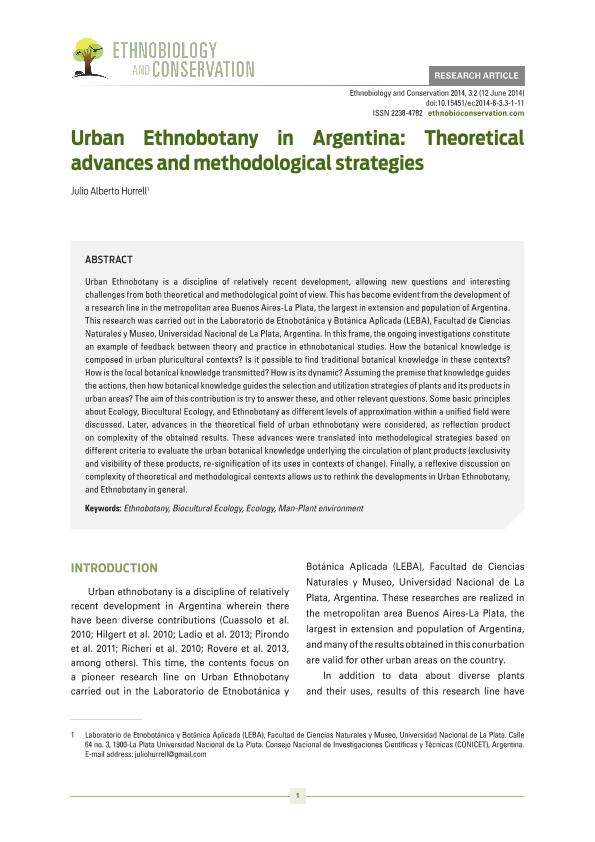Mostrar el registro sencillo del ítem
dc.contributor.author
Hurrell, Julio Alberto

dc.date.available
2018-01-08T13:27:00Z
dc.date.issued
2014-06
dc.identifier.citation
Hurrell, Julio Alberto; Urban Ethnobotany in Argentina: Theoretical advances and methodological strategies; Ethnobiology and Conservation; Ethnobiology and Conservation; 2014; 1; 6-2014; 1-11
dc.identifier.issn
2238-4782
dc.identifier.uri
http://hdl.handle.net/11336/32502
dc.description.abstract
Urban Ethnobotany is a discipline of relatively recent development, allowing new questions and interesting challenges from both theoretical and methodological point of view. This has become evident from the development of a research line in the metropolitan area Buenos Aires-La Plata, the largest in extension and population of Argentina. This research was carried out in the Laboratorio de Etnobotánica y Botánica Aplicada (LEBA), Facultad de Ciencias Naturales y Museo, Universidad Nacional de La Plata, Argentina. In this frame, the ongoing investigations constitute an example of feedback between theory and practice in ethnobotanical studies. How the botanical knowledge is composed in urban pluricultural contexts? Is it possible to find traditional botanical knowledge in these contexts? How is the local botanical knowledge transmitted? How is its dynamic? Assuming the premise that knowledge guides the actions, then how botanical knowledge guides the selection and utilization strategies of plants and its products in urban areas? The aim of this contribution is try to answer these, and other relevant questions. Some basic principles about Ecology, Biocultural Ecology, and Ethnobotany as different levels of approximation within a unified field were discussed. Later, advances in the theoretical field of urban ethnobotany were considered, as reflection product on complexity of the obtained results. These advances were translated into methodological strategies based on different criteria to evaluate the urban botanical knowledge underlying the circulation of plant products (exclusivity and visibility of these products, re-signification of its uses in contexts of change). Finally, a reflexive discussion on complexity of theoretical and methodological contexts allows us to rethink the developments in Urban Ethnobotany,and Ethnobotany in general.
dc.format
application/pdf
dc.language.iso
eng
dc.publisher
Ethnobiology and Conservation
dc.rights
info:eu-repo/semantics/openAccess
dc.rights.uri
https://creativecommons.org/licenses/by-nc-sa/2.5/ar/
dc.subject
Ethnobotany
dc.subject
Biocultural Ecology
dc.subject
Ecology
dc.subject
Man-Plant Environment
dc.title
Urban Ethnobotany in Argentina: Theoretical advances and methodological strategies
dc.type
info:eu-repo/semantics/article
dc.type
info:ar-repo/semantics/artículo
dc.type
info:eu-repo/semantics/publishedVersion
dc.date.updated
2018-01-03T19:03:48Z
dc.journal.volume
2014
dc.journal.number
1
dc.journal.pagination
1-11
dc.journal.pais
Brasil

dc.journal.ciudad
Recife
dc.description.fil
Fil: Hurrell, Julio Alberto. Universidad Nacional de La Plata. Facultad de Ciencias Naturales y Museo. Laboratorio de Etnobotánica y Botánica Aplicada; Argentina. Consejo Nacional de Investigaciones Científicas y Técnicas; Argentina
dc.journal.title
Ethnobiology and Conservation
dc.relation.alternativeid
info:eu-repo/semantics/altIdentifier/url/https://ethnobioconservation.com/index.php/ebc/article/view/554
Archivos asociados
